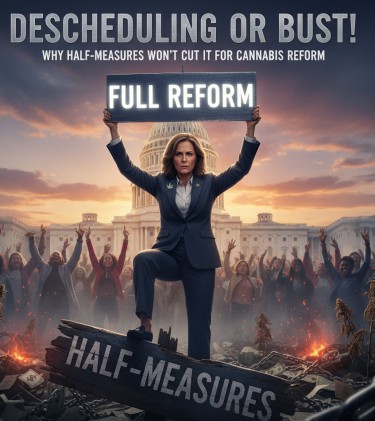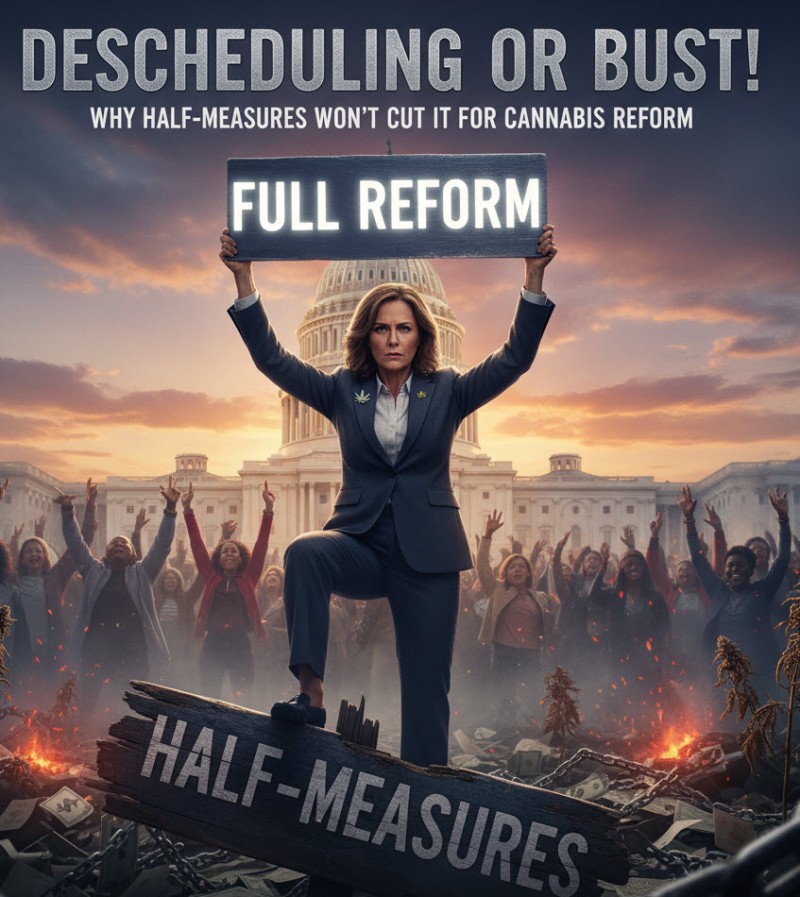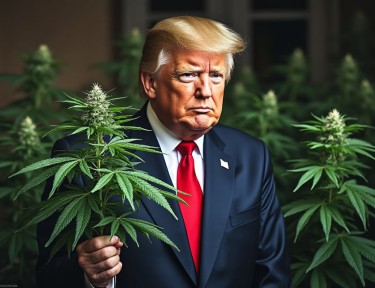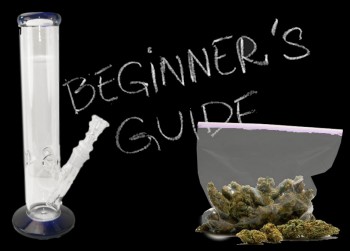
Descheduling or Bust: Why Half-Measures Won't Cut It for Cannabis Reform
I've learned to stop trying to predict the cannabis policy landscape. Every time I think I've got a handle on where things are headed, something completely bonkers happens that reminds me this industry operates on its own bizarre timeline with its own inexplicable logic.
Case in point: Donald Trump recently posted a video discussing the endocannabinoid system while weighing cannabis policy options. Let that sink in for a moment. The guy who built his brand on "law and order" rhetoric is now talking about CB1 and CB2 receptors, even suggesting that covering CBD under Medicare could be "the most important senior health initiative of the century." If you'd told me this five years ago, I'd have assumed you were sampling too many of Colorado's finest concentrates.
But here's the thing about cannabis policy – it's always been a powerful political weapon. Politicians understand that cannabis reform is one of the few issues that can generate genuine enthusiasm and support across traditional party lines. Biden tried to harness this power with his Schedule III proposal, but that was essentially a pharmaceutical industry handout dressed up as reform. It wasn't the people's solution; it was Big Pharma's consolation prize.
Which brings me to Robert Hoban's recent Forbes article that you absolutely need to read if you're serious about understanding where cannabis policy should go. Hoban – who knows more about cannabis law than probably anyone practicing today – lays out the case for why descheduling (complete removal from the Controlled Substances Act) is the only path that actually makes sense. He doesn't just cheerled for his preferred outcome; he methodically examines the pros and cons of rescheduling versus descheduling, showing why one approach creates endless complications while the other provides actual clarity.
I've been banging the descheduling drum for years, often feeling like I'm shouting into the void while politicians play games with scheduling classifications. But now we're at a moment where Trump might actually do something genuinely transformative with cannabis policy. Wouldn't it be the ultimate plot twist if Trump became the president who actually brought back weed? Not through some bureaucratic rescheduling shuffle, but through actual meaningful reform?
Let's explore why descheduling is the only path that makes sense, what the alternatives look like, and why Congress needs to stop playing games and just do the right thing.
Rescheduling Trap: Why Moving Boxes Doesn't Solve the Problem
Rescheduling cannabis sounds reasonable on paper. Take it out of Schedule I, drop it to Schedule III, and suddenly it's "less illegal." Problem solved, right? Not even close.
Hoban's Forbes analysis cuts through this illusion with surgical precision. The fundamental issue with rescheduling is that it keeps cannabis locked within the Controlled Substances Act framework – a system designed in 1970 to manage genuinely dangerous drugs with high abuse potential and limited medical value. Cannabis doesn't fit this framework, and trying to jam it into a slightly different box doesn't change that reality.
Schedule III rescheduling comes with its own nightmare scenario. Sure, it would allow cannabis businesses to take normal tax deductions under 280E, which sounds great until you realize what else comes with Schedule III status. As Hoban points out, you're suddenly dealing with FDA approval processes, prescription requirements, and a regulatory framework that would essentially hand the cannabis market to pharmaceutical companies who can afford to navigate that maze.
Here's the kicker that Hoban emphasizes: under Schedule III, there's no legal pathway for adult-use cannabis at all. Schedule III substances must be used in medicine only. That means every recreational dispensary, every adult-use product, every state program built around non-medical consumption would be federally non-compliant. The entire adult-use market – which represents the majority of legal cannabis sales – would still be illegal under federal law.
Think about the absurdity of this. States with recreational programs would suddenly find themselves more out of sync with federal law than they are now. At least under Schedule I, everyone knows the feds consider all cannabis illegal. Under Schedule III, you'd have this bizarre split where medical cannabis might have a federal pathway while recreational use remains just as prohibited as before.
Hoban walks through the practical disasters this would create. Products perfectly legal under state law – high-dose edibles, vape cartridges, novel formulations – might fail federal scrutiny under Schedule III, forcing operators to reformulate, withdraw products, or risk federal recalls. Dispensary licenses issued under state law might not be recognized federally, creating a two-tier system where some operators have pathways forward and others hit brick walls.
The compliance costs alone would crush most existing cannabis businesses. FDA expectations include drug registration, clinical data, stability studies, quality systems, pharmacovigilance, and adverse event reporting. These aren't minor adjustments – they're pharmaceutical-grade requirements that most cannabis operators are completely unprepared to meet. The companies that could afford this compliance burden? Big Pharma, who would swoop in and dominate the market they've been eyeing for decades.
Even the promise of interstate commerce under Schedule III is illusory. Rescheduling doesn't automatically preempt state restrictions or guarantee federal permission for cross-state shipments. You'd still have a patchwork of state rules, reciprocity requirements, and legal uncertainty that keeps cannabis locked in state-by-state silos.
As Hoban puts it, rescheduling "tethers cannabis to a regulatory architecture not of its making." It's trying to force a square peg into a round hole, and the result is increased costs, legal friction, and risk premiums that make the current system look simple by comparison.
Descheduling Solution: Freedom Through Simplicity
Hoban's analysis of descheduling reads like a breath of fresh air after the suffocating complexity of rescheduling scenarios. His argument is straightforward: remove cannabis entirely from the Controlled Substances Act and let it be regulated like other legal adult products.
Think about what we're actually scheduling here. As Hoban points out, marijuana is a plant. That plant contains over 100 identified cannabinoids, with new compounds being discovered as research expands. The CSA's approach of scheduling the entire plant is actually bizarre – most scheduled substances are specific compounds, not whole plants. Only coca and opium poppy are treated similarly, and even then, it's the active compounds (cocaine, opiates) that are the real targets.
Hoban proposes what he calls "the only future that makes sense": deschedule the plant itself while allowing individual cannabinoids to be scheduled as needed for pharmaceutical development. This is actually how it should work – THC could remain scheduled for pharmaceutical purposes, while the plant and other cannabinoids are freed from federal drug control.
The advantages of this approach are massive and Hoban catalogs them methodically:
-
State Regulatory Primacy: States keep control over licensing, testing, advertising, and distribution. The systems operators already know remain relevant. No federal bulldozer crushing state frameworks.
-
No Pharmaceutical Cage: Operators avoid the heavy drug regulatory regime. They operate under consumer product standards, modified by state rules, not FDA pharmaceutical expectations.
-
Interstate Commerce Potential: If states authorize it, legal cannabis could move across state lines, creating true national markets. Cultivation could happen in optimal locations rather than forcing every state to grow its own.
-
Lower Barriers to Entry: Without pharmaceutical-scale compliance requirements, smaller operators can actually compete. The cost and complexity advantages that favor mega-corporations disappear.
-
Regulatory Clarity for Banking: Financial institutions could treat cannabis like they treat alcohol or tobacco – regulated adult products with clear compliance frameworks, not Schedule I criminal enterprises or Schedule III pharmaceuticals.
Hoban addresses the "Wild West" objection head-on. Critics claim descheduling would create chaos with no oversight, but that's nonsense. States already have sophisticated regulatory systems that would continue operating. The FDA could still regulate cannabis-derived pharmaceuticals under existing drug laws. The FTC could address false advertising. OSHA could ensure workplace safety. Normal regulatory authorities would apply without needing cannabis-specific federal frameworks.
The model already exists: alcohol. When Prohibition ended, alcohol was descheduled and regulatory authority went to states with federal oversight from what became the TTB (Alcohol and Tobacco Tax and Trade Bureau). Hoban suggests a similar approach for cannabis – federal tax collection and trade oversight, while states handle licensing, safety standards, and consumer protections.
This split responsibility works. The TTB monitors compliance with excise taxes, establishes labeling and packaging standards, and enforces interstate commerce rules. States regulate licensing, quality testing, and consumer safety. Operators know who to answer to for what, rather than navigating the byzantine mess that rescheduling would create.
As Hoban emphasizes, descheduling respects federalism, acknowledges that cannabis isn't comparable to heroin or cocaine, creates space for diverse state approaches, and allows the industry to function like other legal sectors. It's not perfect – regulatory fragmentation creates challenges – but it's survivable in ways that rescheduling simply isn't.
Congress Needs to Step Up
Hoban's analysis makes one thing crystal clear: the path forward isn't mysterious or complicated. Descheduling provides actual solutions while rescheduling creates new problems that might be worse than what we have now.
The irony is thick. Trump is talking about the endocannabinoid system, discussing Medicare coverage for CBD, and positioning himself as potentially transformative on cannabis policy. But real transformation requires congressional action. The president can't deschedule cannabis through executive order – that requires legislation removing it from the Controlled Substances Act.
Congress needs to stop treating cannabis like a political football and recognize what Hoban's article demonstrates: the current scheduling framework simply doesn't work for cannabis. Schedule III might score political points while protecting pharmaceutical interests, but it creates a compliance nightmare that would crush most existing businesses while failing to provide legal pathways for adult-use products that represent the majority of the market.
Could Trump surprise everyone and actually push Congress toward descheduling? Given his unpredictability and apparent interest in understanding cannabis science, it's not impossible. Imagine Trump becoming the president who ended federal cannabis prohibition – not through regulatory gymnastics, but through actual legislative reform. That would be one hell of a legacy twist.
But regardless of who champions it, Hoban's analysis shows that descheduling is inevitable. The question is whether we get there through years of struggling with half-measures that fail to solve fundamental problems, or whether someone finally has the courage to do what actually makes sense.
Read Hoban's Forbes piece. Understand the stakes. Then demand that Congress stop playing games and deschedule the damn plant already.






